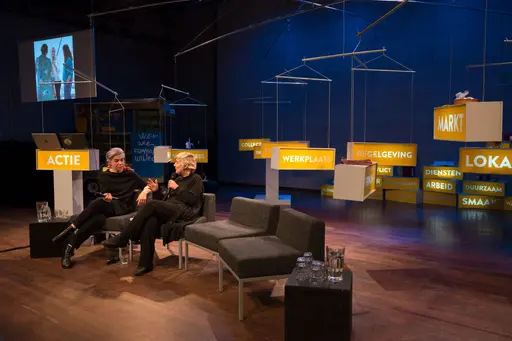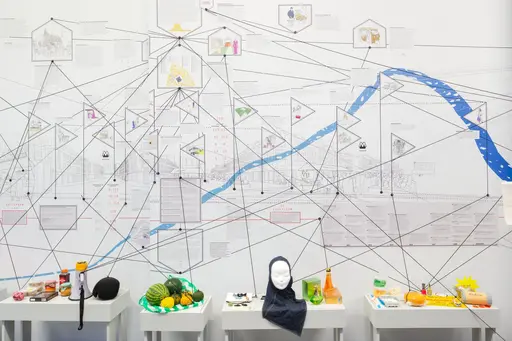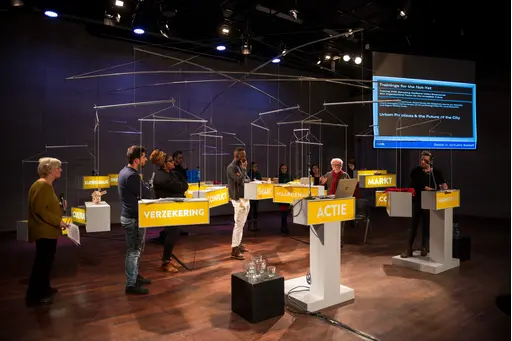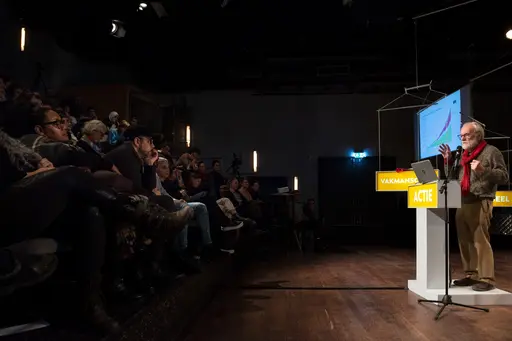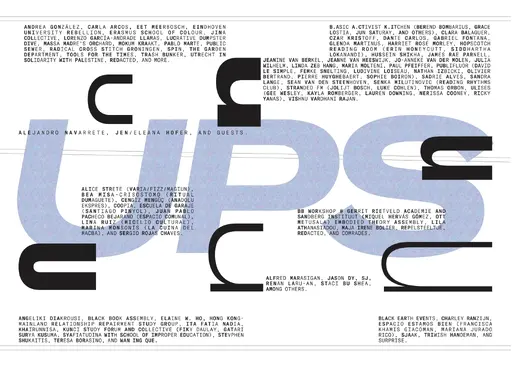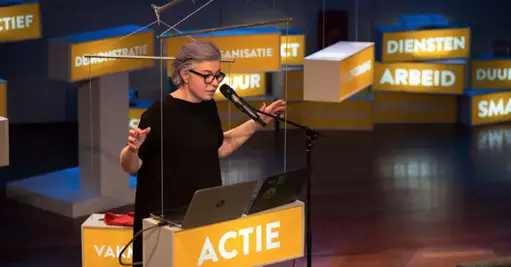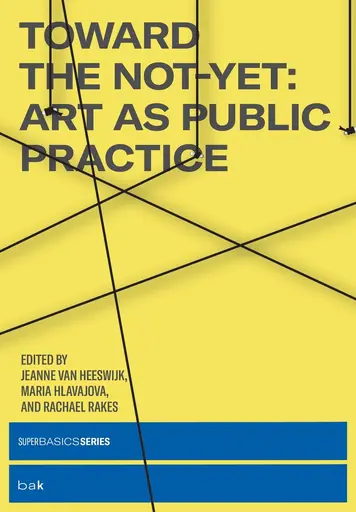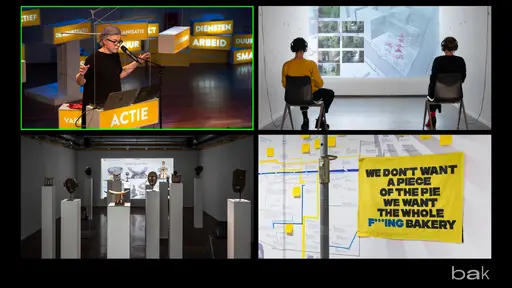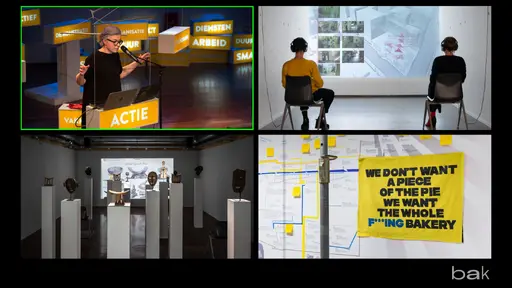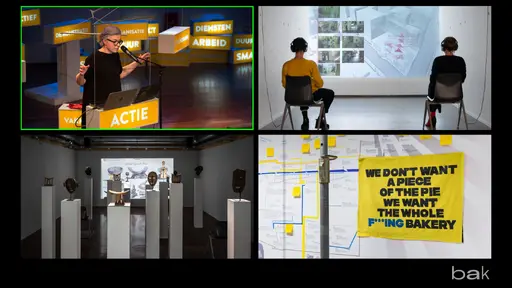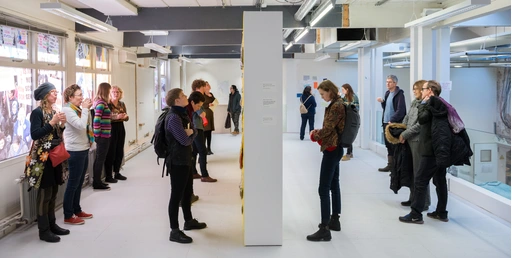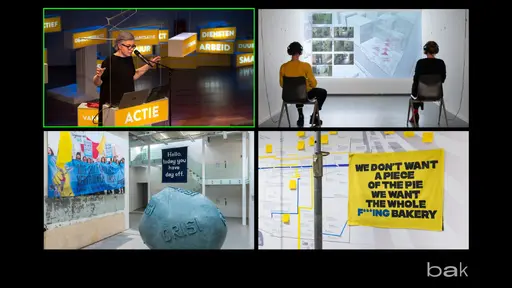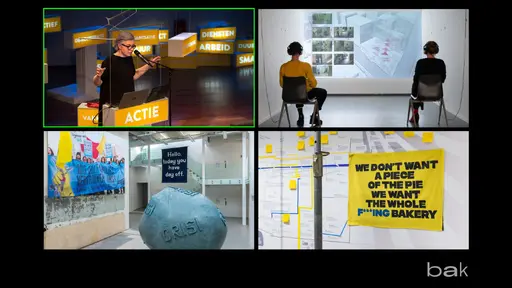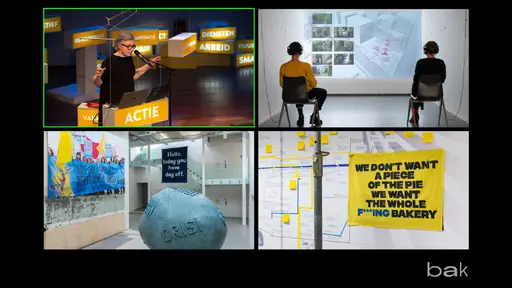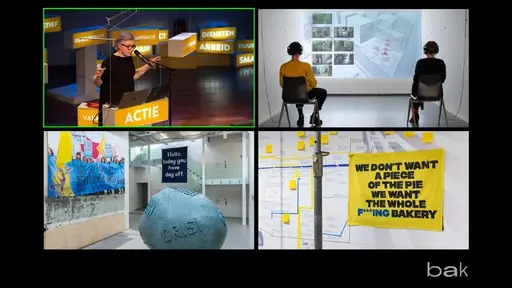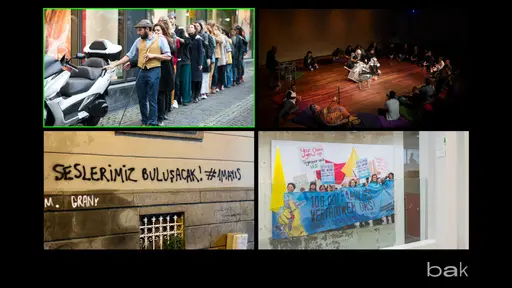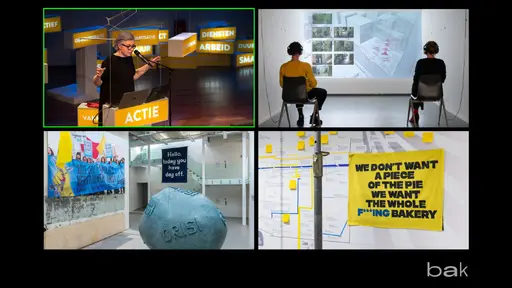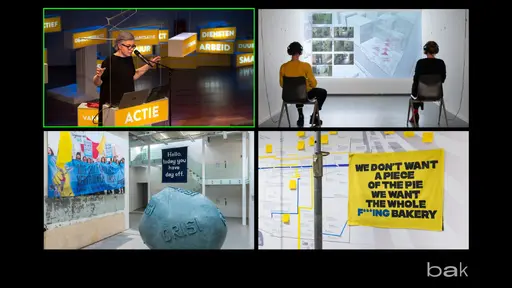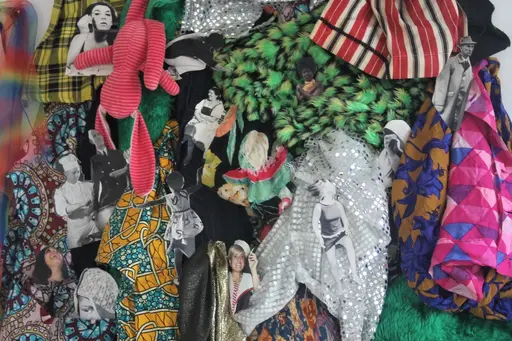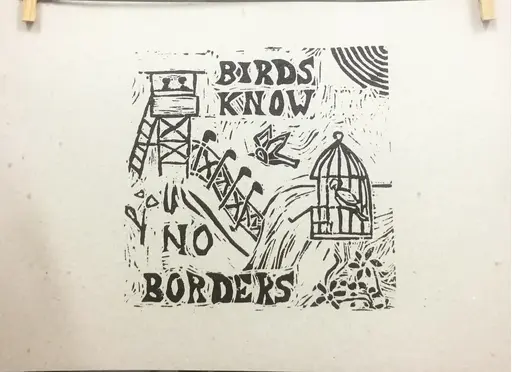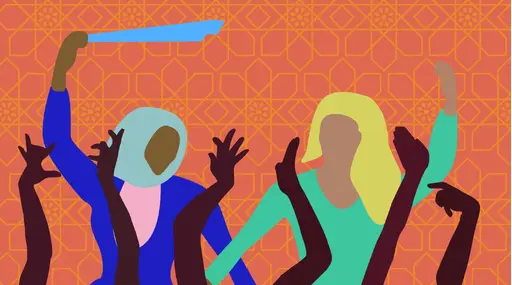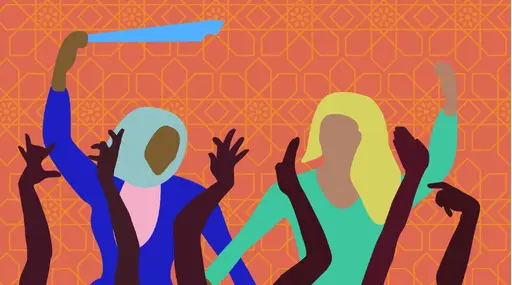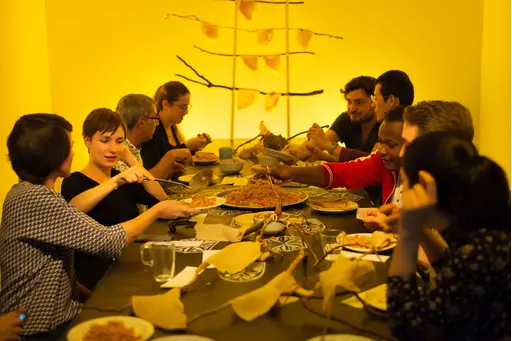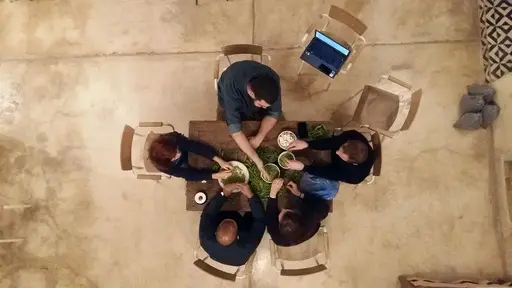until 12 January 2020
Trainings for the Not-Yet
An exhibition as a series of trainings for a future of being together otherwise, convened with a multitude of collaborators by Jeanne van Heeswijk and BAK, basis voor actuele kunst, Utrecht.
With great pride and excitement, BAK, basis voor actuele kunst, Utrecht presents Trainings for the Not-Yet, a project convened by artist Jeanne van Heeswijk. An exhibition that unfolds through a series of trainings in civic engagement, radical collectivity, and active empowerment, the project brings together collaborators from various fields and communities to create and practice alternative imaginings of being together in the face of the pressing emergencies that shape the world today.
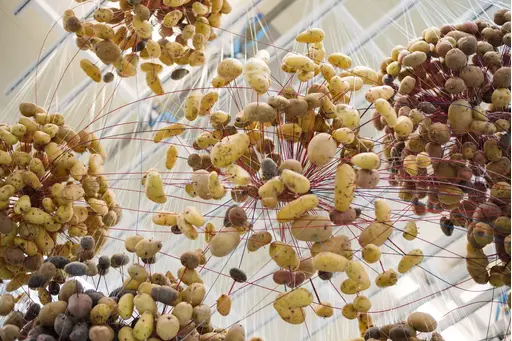
Exhibition through a series of weekly trainings
Opening: Saturday 14 September, 17 hrs
Opening weekend, with special program The City Staircase: Saturday 14 September, 13–00 hrs and Sunday 15 September, 12–18 hrs.
The forthcoming culmination of this trajectory, Trainings for the Not-Yet, is an exhibition that evolves through a series of trainings organized in weekly chapters. The trainings range from “dreamscaping” to radical listening, from creating sanctuary to enacting radical care, from fighting housing struggles to building solidarity economies, and from composing intersectional alliances to becoming collective. They take place amid and with artworks by van Heeswijk as well as by an array of international artists engaged in social change and modeling collectivity. Van Heeswijk sees these works as learning objects.
Meant to be used and accommodated by and in the trainings, they are living repositories of knowledges, stories, and experiences; the tools-in-wait for activation in difficult conversations and joyful praxis; and the archives of past and future anticipations of what “we” want to become when practicing visions of transformative justice, equality, dignity and love, care, resilience, collective power and sharing, and the relationality spawning alternative possibilities. Van Heeswijk’s works include objects and environments from some of her pivotal past and ongoing projects, including Philadelphia Assembled, Philadelphia, 2014–2017; Homebaked, Liverpool, 2010–ongoing; and Public Faculty Series, various locations, 2008–ongoing. Other learning objects comprise works such as Patricia Kaersenhout’s Formats of Care in Times of Violence, 2019; Adelita Husni-Bey’s Agency, 2014; Carmen Papalia’s, White Cane Amplified, 2015; Ultra-red’s Protocols for the Sound of Freedom, 2012; Black Quantum Futurism, Time Travel Experiments, 2017; and Adrian Pipers’s Funk Lessons, 1983, among others.
Opening weekend, with special program The City Staircase: Saturday 14 September, 13–00 hrs and Sunday 15 September, 12–18 hrs.
The forthcoming culmination of this trajectory, Trainings for the Not-Yet, is an exhibition that evolves through a series of trainings organized in weekly chapters. The trainings range from “dreamscaping” to radical listening, from creating sanctuary to enacting radical care, from fighting housing struggles to building solidarity economies, and from composing intersectional alliances to becoming collective. They take place amid and with artworks by van Heeswijk as well as by an array of international artists engaged in social change and modeling collectivity. Van Heeswijk sees these works as learning objects.
Meant to be used and accommodated by and in the trainings, they are living repositories of knowledges, stories, and experiences; the tools-in-wait for activation in difficult conversations and joyful praxis; and the archives of past and future anticipations of what “we” want to become when practicing visions of transformative justice, equality, dignity and love, care, resilience, collective power and sharing, and the relationality spawning alternative possibilities. Van Heeswijk’s works include objects and environments from some of her pivotal past and ongoing projects, including Philadelphia Assembled, Philadelphia, 2014–2017; Homebaked, Liverpool, 2010–ongoing; and Public Faculty Series, various locations, 2008–ongoing. Other learning objects comprise works such as Patricia Kaersenhout’s Formats of Care in Times of Violence, 2019; Adelita Husni-Bey’s Agency, 2014; Carmen Papalia’s, White Cane Amplified, 2015; Ultra-red’s Protocols for the Sound of Freedom, 2012; Black Quantum Futurism, Time Travel Experiments, 2017; and Adrian Pipers’s Funk Lessons, 1983, among others.
Opening weekend
Opening weekend: 14-15 September 2019, The City Staircase
We kick off the opening weekend of Trainings for the Not-Yet with the special project The City Staircase: a two-day program of conversations with and by Utrechters on their concerns about, and ideas for, the future of their city. Trainings for the Not-Yet can be visited free of charge during the opening weekend. The opening weekend of Trainings for the Not-Yet coincides with the festive opening of the new cultural season in the city, Utrecht Uitfeest. The City Staircase is a project by BAK, basis voor actuele kunst,
Utrecht and Jeanne van Heeswijk in collaboration with Utrecht in Dialoog and
Gabriel Erlach.
We kick off the opening weekend of Trainings for the Not-Yet with the special project The City Staircase: a two-day program of conversations with and by Utrechters on their concerns about, and ideas for, the future of their city. Trainings for the Not-Yet can be visited free of charge during the opening weekend. The opening weekend of Trainings for the Not-Yet coincides with the festive opening of the new cultural season in the city, Utrecht Uitfeest. The City Staircase is a project by BAK, basis voor actuele kunst,
Utrecht and Jeanne van Heeswijk in collaboration with Utrecht in Dialoog and
Gabriel Erlach.
Contributors
Jeanne van Heeswijk in collaboration with Laura Raicovich, Maria Hlavajova, Adelita Husni-Bey, Patricia Kaersenhout, Shumaila Anwar (Initiative for Diversity, Inclusion & Peace (IDIP)), Angel Bat Dawid (Le Guess Who?), Utrecht in Dialoog, Habiba Chrifi-Hammoudi (U Centraal), Joy Mariama Smith, Adrian Piper, Denise Valentine, Nancy Jouwe, Black Quantum Futurism (Camae Ayewa and Rasheedah Phillips), Chloë Bass, Beatrice Catanzaro, Kolar Aparna, Mehbratu Efrem Gebreab, Yasmine Eid-Sabbagh (Arab Image Foundation) and Hamada Al-Joumah, Qanat, Jérôme Giller, To Be Determined (Clara Balaguer and Gabriel Fontana), Fran Ilich, Jun Saturay, Ying Que, Grace Lostia, Alejandro Navarrete, Bakudapan Food Study Group, Urban Front (David Harvey and Miguel Robles-Durán), Afrikaanderwijk Coöperatie, Superuse Studios, Freehouse, De Voorkamer (Pim van der Mijl and Shay Raviv), W.A.G.E, Philadelphia Assembled (Toward Sanctuary Dome), Staci Bu Shea (Casco Art Institute), Laced-Up Project (Sarah Mobley and Maaike van Dooren), Whitney Stark, Carmen Papalia, Zein Nakhoda, Homebaked Community Land Trust, Britt Jürgensen, Marianne Heaslip, URBED, Homebaked Bakery (Angela McKay), Homegrown Collective (Samantha Jones), Selçuk Balamir (de Nieuwe Meent, Code Rood), Joska Ottjes (Vereniging de Kasko, Bond Precaire Woonvormen), Irene Calabuch Mirón, Ethel Baraona Pohl, Refugee collective We Are Here, Elke Uitentuis, Abdulaal Hussein and Paul de Bruyne, New Women Connectors, Stranded FM, Joram Kroon (Prace), Welkom in Utrecht, Gabriel Erlach, Ultra-red, Mustapha Seray Bah (Stichting Mowad), Goldsmith.Company, and Extinction Rebellion Utrecht
About Jeanne van Heeswijk
Jeanne Van Heeswijk is an artist whose projects seek to encourage and realize citizen engagement in shaping environments, while transcending the traditional boundaries of art. Van Heeswijk is a BAK 2018/2019 Research Fellow as part of the post-academic BAK Fellowship Program.
Trainings schedule
We are thrilled to share the schedule for Trainings for the Not-Yet. These community-to-community trainings, with artists, organizers, activists, dancers, cooks, and more, take place every week, Wednesdays–Sundays (with exceptions) between 14–18 hrs at BAK and are accompanied by a collective dinner (on weekdays, 18–19 hrs) and lunch (on weekends, 13–14 hrs) at the Basic Activist Kitchen. See the full training program here on the BAK website.
Long-Term ProjectPropositions for Non-Fascist Living
with: Jeanne van Heeswijk, Laura Raicovich, Adelita Husni-Bey, Patricia Kaersenhout, Shumaila Anwar, Habiba Chrifi-Hammoudi, Joy Mariama Smith, Adrian Piper, Denise Valentine, Nancy Jouwe, Black Quantum Futurism (Camae Ayewa and Rasheedah Phillips), Chloë Bass
Training XXIITraining XXTraining XXITraining XVIIITraining XVI Training XVII Training XVPropositions #9/4 Training Propositions #9/3 Training Propositions #9/2 TrainingPropositions #9/1 Training Training XIIITraining XIITraining XIStranded FMTraining XTraining VIII Training IXTraining VII Training VI Training IV Training V Training IIIThe Basic Activist KitchenTraining II Training Program Training I Opening Trainings BAK, basis voor…related
